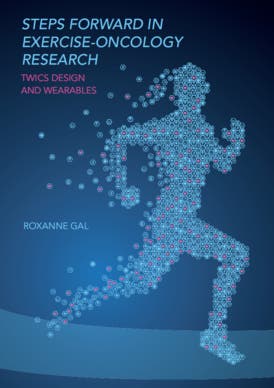Roxanne Gal
Steps forward in exercise-oncology research. TwiCs design and wearables.

- Datum
- (Co) promotoren
- 16-01-2020
- prof. dr. A.M. May, prof. dr. P.H.M. Peeters, dr. E.M. Monninkhof
Samenvatting
There is substantial evidence on the beneficial effects of physical activity in patients with breast cancer. However, patients with breast cancer were less physically active up to three years after diagnosis compared to the general Dutch female population. Therefore, it is important to stimulate physical activity during and after breast cancer treatment, but how physically active are these patients? Also, advances in the device- and smartphone technology offers opportunities for promoting physical activity. Exercise programmes using wearables and smartphone applications were more effective in promoting physical activity than exercise programmes without wearebles and smartphone applications. In the field of exercise-oncology research, reported beneficial effects of exercise found on fatigue and quality of life were often small, probably partly caused by shortcomings of the RCT design when evaluating interventions. Who receives the exercise programme is determined by chance. This may be disappointing and patients do not want to participate, they withdraw from the control group or they start exercising on their own. The Trials within Cohorts (TwiCs) design was proposed as an alternative to conventional pragmatic RCTs. The UMBRELLA Fit study used the innovative Trials within Cohorts design to examine the effectiveness of a 12-week exercise intervention on the quality of life and fatigue of inactive patients with breast cancer. This thesis describes the UMBRELLA Fit study that used the innovative TwiCs design, from design to analyses. In addition, the challenges and benefits when conducting a trial within a cohort compared to conventional exercise-oncology RCTs were describes, as well as the results of the UMBRELLA Fit study. Based on our experiences, we developed a practical guide that can be used in designing future pragmatic exercise-oncology trials using the TwiCs design.
